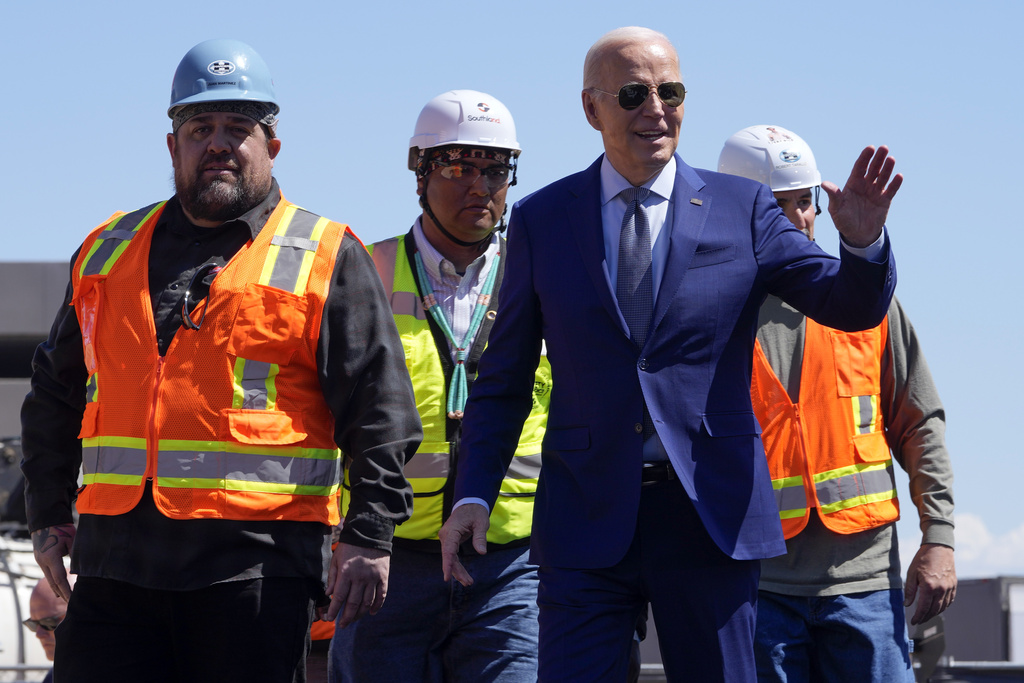

Rising gas prices that hit a new milestone are rankling President Joe Biden‘s 2024 election chances when the Democrat is already suffering from historically low approval ratings.
Costs at the pump have been rising for months, with the national average climbing to $3.47 on Monday, according to AAA. That level represents the first time the year-over-year change in gas prices has increased since December of last year.
Much like prices at the grocery store that have been stubbornly high due to inflation, costs to fill up a tank of gas are daily reminders shaping how voters see the economy.
Biden campaign officials downplayed the current cost of gas, suggesting that the president will have plenty of time to sell voters on his agenda ahead of the election in November.
White House officials also maintain that Biden and the administration are “always monitoring” gas prices and other elevated costs hampering households.
“So, look, the president has done everything that he can to deal with with oil. Obviously, lowering — the actions that he took led to lowering gas prices,” White House press secretary Karine Jean-Pierre told reporters Tuesday. “We’re always monitoring. We’re always watching.”
However, Moody’s predicted that Biden will defeat former President Donald Trump in November should prices hold around $3.15, up roughly 40 cents per gallon compared to January.
“President Biden’s expected re-election rests in part on gasoline prices remaining in the $3 per gallon range,” Moody’s economists Mark Zandi, Brendan LaCerda, and Justin Begley claimed in their February election forecast. “All else equal, if gas prices surge back close to $4 per gallon, Trump will win.”
Moody’s noted that oil prices are notoriously difficult to predict, yet disruptions in global markets, coupled with typical summer increases, could continue to place upward pressure on prices heading into November.
In particular, Oil Price Information Service’s Tom Kloza suggested that attacks by Ukrainian forces against Russian refineries are driving up the cost of oil.
“It appears pretty clear that Ukrainians have discovered the best way to attack Vladimir Putin is to attack him in his wallet. That means knocking out refineries,” Kloza said in an interview with CNN. “It’s a wildcard we’ve never had to deal with before.”
“If they continue to target petroleum infrastructure, you could see global price rise higher,” Kloza concluded.
Meanwhile, attacks in the Red Sea by the Iranian-backed Houthi rebel forces continue to divert some oil tankers away from the Middle East, though that conflict has not yet appeared to have exerted as much upward pressure on prices as experts first predicted in the immediate wake of the Oct. 7 terrorist attacks.
Americans have grown accustomed to elevated gas prices across Biden’s three-plus years in office, though the overwhelming majority of spikes can be attributed to the war in Ukraine. On Biden’s watch, average domestic gas prices peaked at more than $5 per gallon over the summer of 2022, shortly after Russia invaded Ukraine, which coincided with Biden’s lowest approval ratings as president.
In mid-June of 2022, U.S. gas prices hit $5.10 nationally, and Biden’s approval rating cratered to just below 37% the following.
General energy costs have historically been one of the core drivers of inflation in the United States, and therefore can be closely linked to any president’s favorability. However, the University of Virginia’s Center for Politics argues that the direct correlation between elevated gas prices and presidential approval ratings has actually decreased over the past five decades.
“That a president would prefer to have lower gas prices than higher ones is obvious. That high gas prices actually do contribute to lower presidential approval is not as obvious, although there is some limited evidence for it based on what we’ve found in our research,” UVA’s Kyle Kondik wrote in 2022. “But we also are in an era of fairly stable presidential approval ratings, meaning that it shouldn’t be surprising that whatever impact a single factor (gas prices) might have on presidential approval, the importance of that factor might be declining.”
Still, the election isn’t for another seven-odd months, and while prices will likely cool following the summer rush, Biden will be susceptible to gas-focused political attacks across that time.
House Majority Leader Steve Scalise (R-LA) announced at the GOP’s annual conference in March that Republicans are preparing a slate of bills meant to highlight Biden’s “radical, anti-energy agenda,” and opposition to increased fossil fuel production in particular.
CLICK HERE TO READ MORE FROM THE WASHINGTON EXAMINER
This slate of bills would seek to block the Biden administration’s regulation of new oil and natural gas leases, seek to block the White House from placing a moratorium on fracking, and includes resolutions directly blaming Biden for elevated gas prices, though none of that legislation is likely to pass the Senate.
Meanwhile, Trump himself continues to campaign against Biden’s energy policies, falsely claiming that oil and gas prices are currently at “an all-time high.”





